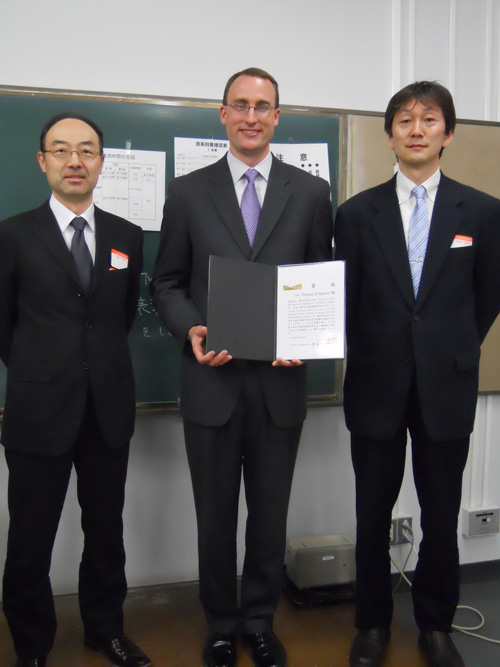
At a recent conference in Yokohama, Japan, Douglas Spearot, associate professor of mechanical engineering, walked onto the stage right after Dan Shechtman, the 2011 Nobel Prize winner in chemistry.
“His conference keynote lecture directly preceded the individual symposia, and as my invited talk was first in the Ultra-Fine Grained Materials symposium, I started my presentation with a joke that never in my life did I ever expect to be giving a lecture after a Nobel Prize winner,” explained Spearot.
Spearot was in Japan as the 2012 recipient of the Young Leader International Scholar Award from the Minerals, Metals and Materials Society, or TMS. As the recipient of this award, Spearot presented a paper at the annual meeting of the Japan Institute of Metals, and he had the opportunity to visit the National Institute for Material Science in Tsukuba, Japan, where he gave a lecture on atomistic simulation and its impact on nanoscience and nanotechnology.
At the Japan Institute of Metals’ annual meeting, Spearot delivered a talk entitled “Grain Boundary Behavior and Grain Size Dependent Flow Strength in Nanocrystalline Copper doped with Antimony.” In this talk, he described his efforts to create stronger and more stable forms of nanocrystalline metals.
Spearot and his doctoral student Rahul Rajgarhia used atomistic simulation to predict the effects of adding antimony atoms to the grain boundaries of nanocrystalline copper. Every metal is made of grains, or crystals, in which the atoms are aligned. The size of these grains determines the strength of the metal: the smaller the grain, the stronger the metal. Nanocrystalline metals are very strong, but they are also vulnerable to heat, which can cause the grains to grow, leading to decreased strength.
Working with Ashok Saxena, distinguished professor of mechanical engineering, Spearot and Rajgarhia used atomistic simulation to demonstrate that the addition of antimony atoms keeps the grain boundaries of nanocrystalline copper from migrating when subjected to heat, increasing the thermal stability of this material. As a secondary benefit, the antimony atoms also modestly increase the overall strength of nanocrystalline copper.
Spearot’s findings pave the way for experiments on the metals themselves, and could lead to a new generation of stronger nanomaterials that can be used at elevated temperatures. This work has been published in the Journal of Materials Research, the Journal of Materials Science and JOM, the official publication of the Minerals, Metals and Materials Society.
Contacts
Camilla Medders, director of communications
College of Engineering
575-479-5697, camillam@uark.edu